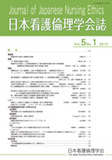Japanese
English
- 販売していません
- Abstract 文献概要
- 参考文献 Reference
看護における倫理的な意思決定について2つの事例を通して述べる。これには、価値の対立の状況や倫理的な不確かさを明らかにし、理解のために必要不可欠な事例の諸側面を集め、方法に基づく秩序だった分析を行い、より良い倫理的な成果に到達するために対人関係技能という徳を用いる能力が含まれる。倫理的な不確かさや価値の対立の影響を受けやすい状況として、非健康的な行動をとる患者、好みに応じる条件を有する患者、曖昧な確かさを持つ状況が明らかにされる。倫理的な不確かさを持つ状況を十分に理解するために不可欠な5つの側面について検討される。すなわち、1)事実、2)問題解決に必要な決定、3)問題解決のために必要とされる重要な区別の明確化、4)社会的文脈の影響の明確化、5)関連する権力と権限の系統の明確化である。倫理的な分析は、多元的な連続体のなかでバランスをとることとして記述される。価値の対立や倫理的な不確かさに対するアプローチとして、諸原則と卓越した倫理的な関係技能とを結合したアプローチと、権利のみに依拠したアプローチとが比較され、それによって対人関係技能の価値が明らかにされる。
The practice of ethical decision-making in nursing is illustrated using two cases. This includes the ability to identify situations of values conflict and ethical uncertainty, gather the aspects of the case essential to understanding, perform methodic analysis, and use the virtue of relational skill to achieve better ethical outcome.
Situations vulnerable to ethical uncertainty and values conflict are identified including patients with unhealthy behaviors, patients with preference sensitive conditions, and situations of marginal certainty. The five aspects essential to full understanding of situations of ethical uncertainty discussed are: 1) The facts; 2) The decisions required to resolve the issue; 3) Identifying the critical distinctions needed to resolve the issue; 4) Identifying the influence of social context; and 5) Identifying relevant lines of power and authority. Ethical analysis is described as the balancing of multi-factorial continua. The value of relational skill is illustrated by comparing a combined approach of principles with skillful-ethical use of relationship to a rights-only approach to values conflict and ethical uncertainty.
Copyright © 2013, The Japan Nursing Ethics Associatin. All rights reserved.


